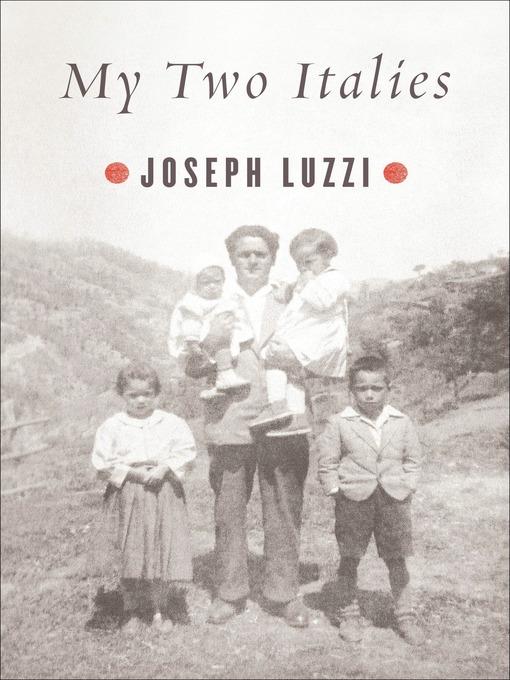
My Two Italies
A Personal and Cultural History
کتاب های مرتبط
- اطلاعات
- نقد و بررسی
- دیدگاه کاربران
نقد و بررسی

May 12, 2014
Midway along the journey through his life, Dante scholar Luzzi (Bard College) wakes to find himself in a dark wood of longing and desire, wishing to know more about his Calabrian heritage. Luzzi, a wonderful storyteller, plays Virgil to our pilgrim, guiding us through the schizophrenic character of Italian culture. To arrive at a deeper understanding of his Italian heritage, Luzzi enrolls in a doctoral program in Italian literature and language, studying Dante and Northern Italy rather than his family ancestral homeland of Calabria in the south. Luzzi energetically, and with some nostalgia, recounts stories of his various travels through Naples and Florence, his encounters with the works of Italian writers, and his meetings with members of his family. He learns that “the Italian family is like Italy itself: fragmented on the surface, riven by intrigue, resistant to change, suspicious of outsiders, and quick to set individual interests over group ones.” In the end, Luzzi embraces his two Italys—Calabria and Tuscany—not as a burden or as a struggle, but as a gift that has brought him “inside the disappearing world of my parents and millions of other Italian exiles.”

May 1, 2014
Memoir from Luzzi (Italian/Bard Coll.; Romantic Europe and the Ghost of Italy, 2008, etc.), who, as the first American-born child of Italian immigrants, felt alienated from his parents' roots.Raised in suburban Rhode Island, educated at Tufts University and Yale, he felt closer to the aesthetically rarefied Italy of Dante and Michelangelo than to the poverty and superstition of his family's native Calabria. There were two Italies, the poet Shelley had taught him, "one sublime and the other odious." Popular media further fueled his "cultural schizophrenia," with Italian-Americans portrayed as thugs in The Sopranos and The Godfather. Italian-American identity remains enigmatic, Luzzi believes, since "our pride in our ancestors grows with the distance we set between them and ourselves." Attempting to bridge that distance, Luzzi embarked on a journey of discovery, examining the social, political and cultural differences between the wealthy, Europeanized north and the "carnal violence" of the south, his parents' background, and his own fraught relationship with Florence, where he has lived. Family, he discovered, is central to Italian life. Mothers, for example, selflessly fulfill the needs of their sons well into adulthood. "In Italy," Luzzi found, "unmarried men don't cut the umbilical cord and apron strings; they stretch them out." Family loyalty, though, prevents the formation of "informal civic traditions" that foster a sense of "national community." Cynicism, coupled with a celebration of "the art of living rather than...the ties that bind" has resulted, Luzzi concludes, in "an unhealthy Italian body politic." Italy today, writes the author, is mired in crisis: an aging population, deadening bureaucracy, rising unemployment and endless corruption.Luzzi's evocative personal history and incisive cultural critique illuminates the complex forces that have shaped his own identity. Being Italian and American, he comes to realize, has been both a bountiful gift and "an ethnic cross I had to bear."
COPYRIGHT(2014) Kirkus Reviews, ALL RIGHTS RESERVED.

June 1, 2014
The American-born son of poor but tough Calabrian immigrants, Luzzi yearned for the Italy of Dante and Michelangelo, not the one of sharp cheese and salted anchovies. But while building a distinguished scholarly career writing about Italian high culture, the very different Italy of his parents continued to haunt him with the smells of its cooking, the calloused hands of his uncles, and the unsentimental way in which his mother dispatched animals for the family table. Luzzi is not, of course, the first to note the distance between these two Italiesas he notes, Tony Soprano grappled with the same issuebut the contrasting ideals provide Luzzi with a lens through which to examine Italy and the Italian American experience, especially that of his family. In part, he is trying to puzzle through the miseria of his parents, who survived the war to suffer a lifetime of backbreaking labor and enduring but pugnacious love. But when Luzzi shares his deepest painthe sudden death of his pregnant wife in a car accidenthis investigations of his extended family turn powerfully poignant, for it was they who cared for his infant daughter while he curled in a fetal position in his childhood bed. The result is a memoir that balances thoughtful observation with feelings that, one senses, still remain quite raw.(Reprinted with permission of Booklist, copyright 2014, American Library Association.)

























دیدگاه کاربران